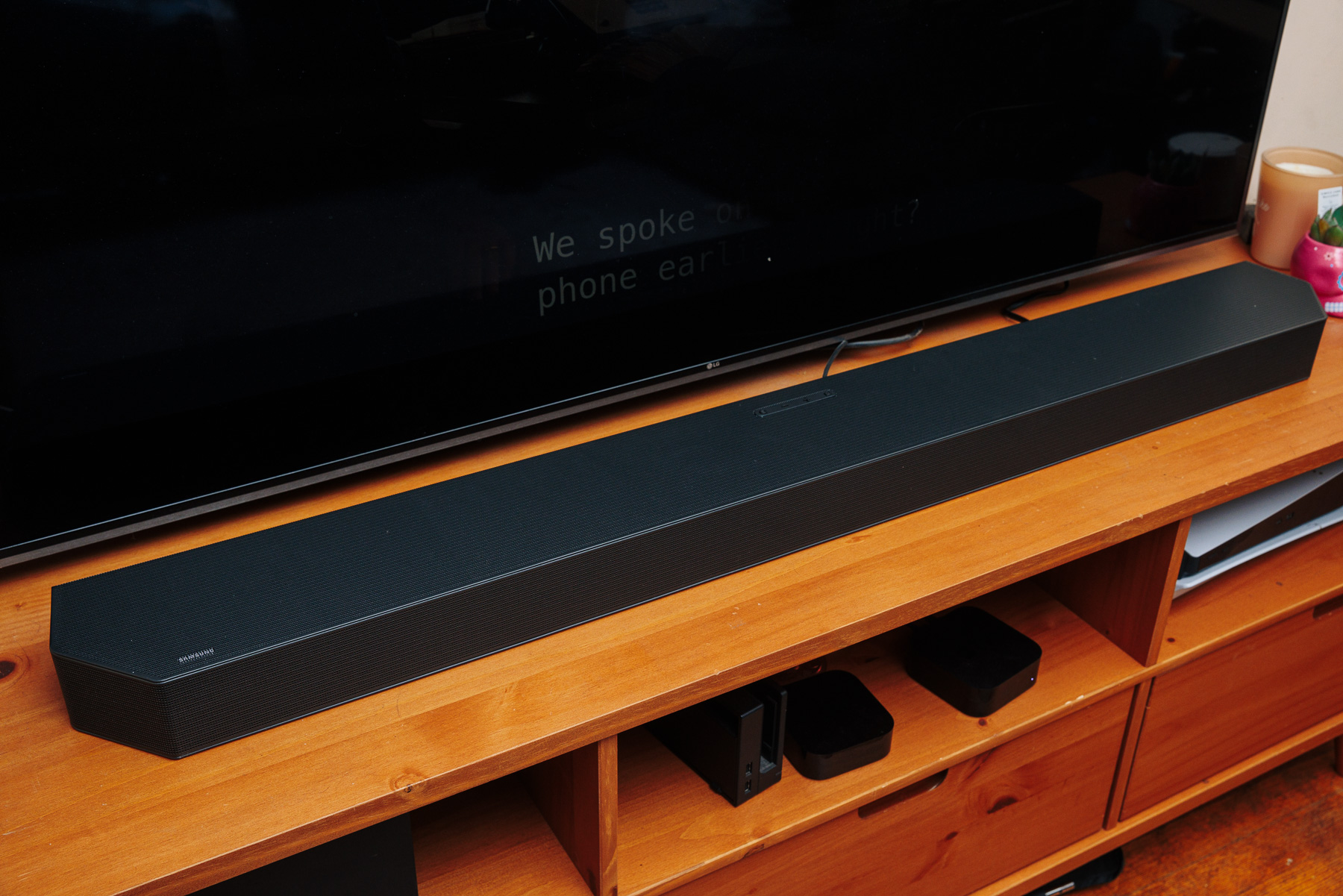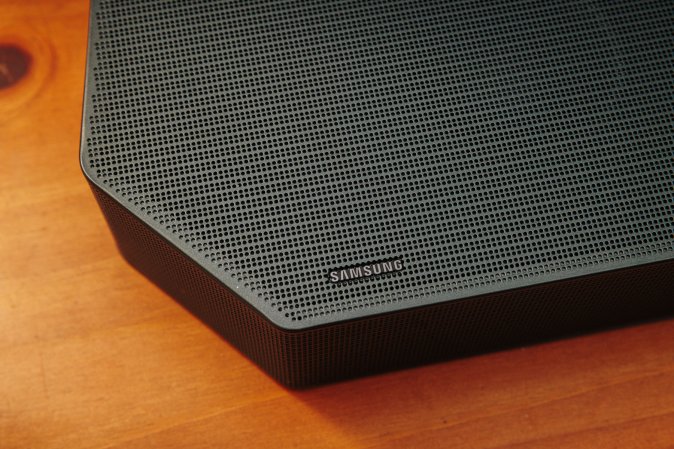

We may earn revenue from the products available on this page and participate in affiliate programs. Learn more ›
Samsung’s screens get a lot of attention, but what’s a vivid image without equally detailed sound? The HW-Q900C is the simplest soundbar option at the high end of Samsung’s lineup. This 7.1.2 system provides effective surround sound, punchy bass, and some of the clearest dialog we’ve heard with just one soundbar and a wireless subwoofer. It sets up simply and performs admirably, especially if you’re connecting it to a Samsung TV. But, with so many options out there, is it worth your precious media console real estate?
Samsung Q900C soundbar close-up
Overview
- This is Samsung’s flagship soundbar that ships with a remote and a subwoofer, no satellite speakers.
- The subwoofer connects wirelessly, so it only requires a power cord.
- Q900C attaches to a TV using HDMI (two inputs and one output) or infrared.
- Wireless connectivity includes Apple AirPlay 2 and Bluetooth 5.
Pros
- Excellent overall sound quality
- Some of the best dialog performance we’ve heard
- Very easy setup
- Impressive surround sound performance
- Fills a big room
- Provides plenty of volume
- Rumbly bass
Cons
- Some niche features only work with a Samsung TV
- Big
- Pricey
Verdict
This high-end component provides some of the best sound we’ve heard out of a soundbar, especially considering that it doesn’t require any satellites (though you can add rear satellites if you want after the fact). This is a worthy upgrade, especially if you have a modern Samsung TV that can take advantage of the extra features.
Samsung HW-Q900C soundbar build
Samsung offers two higher-end soundbar setups: the HW-Q910C, which features the same soundbar and subwoofer as the HW-900C but packaged with wireless Left/Right rear speakers, and the HW-Q990C, that same soundbar and subwoofer but with a pair of wireless satellites with height channels to make it an 11.1.4 configuration. That makes the HW-Q900C a simplified flagship, which is ideal for users who may have a slightly smaller room or don’t need maximum surround sound effects.

The bar itself, 17 pounds of mostly sturdy metal with hexagonal angles, houses nine speakers in a 7.1.2-channel arrangement powered by 246 watts of built-in amplification. The bar is 48 inches long, which makes it just about as wide as my 65-inch TV, so it’s not a small device (though there are even heftier all-in-one soundbars out there). The 25-pound subwoofer is also somewhat chunky, but it contains an 8-inch woofer powered by a 200-watt amp.
The box includes a mounting kit and the necessary hardware to put the soundbar up on a wall. I didn’t install it on my wall (I swap out soundbars too often to mount them), but it uses very standard and simple hardware that should be simple to install.
Samsung HW-Q900C soundbar setup and design
Setting up the Samsung HW-Q900C is refreshingly simple. The bar sports two HDMI inputs (plus one HDMI out) and an infrared input. The ports don’t support HDMI 2.1 and, therefore, can’t passthrough 4K @ 120Hz. Still, they can handle 4K with HDR10 and HDR10+ and are eARC compatible, so if you’ve got a flagship gaming TV (like Samsung’s own OLED 4K S95C or NEO QLED 8K QN900C), you can just connect your console and soundbar directly to the screen and the setup is extremely simple right out of the box.
I’m testing an LG TV at the moment, and the HW-Q900C immediately worked well with the LG remote without finagling. If you want to stop there, you can with the setup, but more advanced users can dig into tuning and calibrating with the Samsung SmartThings app, and Samsung TV owners can use the automatic SpaceFit Sound Pro option.

Setting up the subwoofer requires little more than plugging it into the wall. It connects wirelessly and instantly. From opening the box to watching a movie (with basic setup), it took me less than 10 minutes. If you plan to tweak and go through the auto calibration, plan for roughly an hour.
Samsung HW-Q900C soundbar performance
Simply put, the Samsung HW-Q900C is one of the overall best-sounding soundbars I’ve heard. It’s solid for streaming music, even though it’s eclipsed in tunefulness by more purpose-built bars like the Sonos Arc, so if you’re ready to take a deep dive into spatial audio, consider that with the Sonos Era 300 speakers. The HW-Q900C, however, is excellent for watching movies and TV shows, in large part because of its ability to render dialog. During testing, I fired up a MAX stream of the woefully awful but sonically dramatic Jason Statham movie Meg 2: The Trench. Despite its nonsensical plot, the movie has a persistent bass rumble that ebbs and flows throughout the movie as the characters putter around under the sea. That lets me hear how granularly a system can modulate that low end while monitoring how well the actor’s voices cut through. The Samsung, aided by adaptive room correction and Active Voice Amplifier (AVA) processing, did outstanding in both cases.
The subwoofer, with its “acoustic lens” design for deeper extension in a slimmer enclosure, provides true boominess when required for explosions and punchy impacts while deftly producing subtler ripples that add essential mood and ambiance to a movie.

The HW-Q900C supports both Dolby Atmos and DTS:X surround sound technologies, and it offers an impressively immersive sound considering its lack of stand-alone satellites. Up-firing speakers and the soundbar’s 48-inch width give it physical advantages compared to smaller units. I fired up a Blu-ray player to watch my old standby testing movie, Alien on 4K disc, and found that the surround sound performance was excellent overall. Alarms blared behind my head, and that weirdly wet alien noise sounded like it could have been coming from anywhere in the room.
I was similarly impressed with the sonic presence in less action-oriented movies. The Wolf of Wall Street, streamed in 4K with Dolby Atmos on Netflix, made the dialog sound as clear and crisp as it ever has. The high-end performance allowed me to keep the volume relatively low while keeping the dialog perfectly intelligible. That’s a big win.
Q900C sound modes
Switching between modes is relatively simple with the included remote, but the display on the front of the bar itself is very low-res and scrolls like the Lotto sign in the window of a bodega. It gives you an idea of what mode you’re in, but digging into the SmartThings app makes it simpler. If you go through the process of calibrating the system to your room, you likely won’t flip through the modes very often anyway.
The gaming mode is one exception, as it emphasizes the directionality of the sounds to keep you aware of what’s happening around you as you game. Using it with a PlayStation 5, I could appreciate the difference.

Music performance
I’m not a huge fan of soundbars for music playback in general, but the HW-Q900C is perfectly capable. I listened to everything from the sad, twinkly Fiona Apple cover of the Beatles’ “Across the Universe” to the ruthlessly bombastic metalcore “Overthrone” by Judiciary. The bass comes across a bit strong, but the clean highs prevent things from falling into “muddy” territory.
The real draw for playing music on the HW-Q900C is its simple connectivity. It easily connects via Bluetooth (the SBC codec) or Apple AirPlay 2 via WiFi (the far-preferable method). The soundbar also includes Alexa voice control, so if you use a compatible service, you can just ask the virtual assistant to play your music for you.
Special features for Samsung users
Samsung would love for you to buy a 2022/2023 Samsung TV to go with your fancy new soundbar, and the company has added some exclusive features to make them more enticing. The Q-Symphony feature allows the HW-Q900C to work in concert with the TV’s built-in speakers to center and sync audio even more tightly to the on-screen action. Current Samsung TVs can also send a Dolby Atmos signal over Bluetooth to the soundbar for a wireless connection (though Q-Symphony requires a wire). That’s very handy, but also probably not worth basing your entire TV choice on.
So, who should buy the Samsung HW-Q900C soundbar?
The Samsung HW-Q900C currently retails around $1,000, which puts it in the high-end category. But, with excellent surround sound performance, clear bass, and some of the best dialog reproduction I’ve ever heard, it’s a Dolby Atmos soundbar worth the investment if you can swing it. Some more advanced users may prefer the upgraded Q990C with its more immersive wireless surround sound system. Still, Samsung’s bar and subwoofer combo had absolutely no problem filling my very average-sized suburban living room on its own. If you’re already using a newer Samsung TV and can access the extra features of the pairing, it’s an even better value.
Ultimately, this is a great pick for anyone looking for a high-performance setup that doesn’t take up much space or require a lot of setup. Just plug it in, fire up Meg 2: The Trench, and let the great sound drown out the plot holes.

